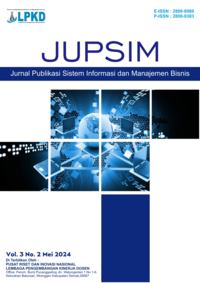From Offline to Online : Transformasi Inovasi Bisnis UMKM Desa Karangasem dengan E-commerce di Era Digital
DOI:
https://doi.org/10.55606/jupsim.v4i2.4075Keywords:
Business Innovation, Digital Economy, Digital Transformation, E-Commerce, MSMEsAbstract
This study explores the case of MSMEs (Micro, Small, and Medium Enterprises) in Karangasem Village undergoing a transformation from offline to online business systems through the adoption of e-commerce in the digital era. The main issue examined is the limited market reach and lack of business innovation faced by local MSME actors, with the aim of exploring the digital transformation process and its impact on business development. A qualitative approach was employed, using data collection techniques such as in-depth interviews, observation, and documentation involving several MSME actors in the village. The findings indicate that the implementation of e-commerce has brought significant changes in marketing, distribution, and order management. However, challenges such as limited digital skills and inadequate internet infrastructure still persist. The synthesis of ideas reveals that technological training and collaboration among entrepreneurs are key factors for successful transformation. In conclusion, the business transformation of Karangasem Village MSMEs through e-commerce has great potential to enhance competitiveness, but requires continuous support to effectively adapt within the digital ecosystem.
References
Albshaier, L., Almarri, S., & Hafizur Rahman, M. M. (2024). A review of blockchain’s role in e-commerce transactions: Open challenges, and future research directions. Com-puters, 13(1). https://doi.org/10.3390/computers13010027
Costa Climent, R., & Haftor, D. M. (2021). Business model theory-based prediction of digital technology use: An empirical assessment. Technological Forecasting and Social Change, 173. https://doi.org/10.1016/j.techfore.2021.121174
Hendricks, S., & Mwapwele, S. D. (2024). A systematic literature review on the factors in-fluencing e-commerce adoption in developing countries. Data and Information Management, 8(1). https://doi.org/10.1016/j.dim.2023.100045
Junita, M. A., Sos, S., & Si, M. (n.d.). Digital Business. [Publisher not specified].
Kohtamäki, M., Parida, V., Oghazi, P., Gebauer, H., & Baines, T. (2019). Digital servitization business models in ecosystems: A theory of the firm. Journal of Business Research, 104, 380–392. https://doi.org/10.1016/j.jbusres.2019.06.027
Loock, M. (2020). Unlocking the value of digitalization for the European energy transition: A typology of innovative business models. Energy Research & Social Science. https://doi.org/10.1016/j.erss.2020.101740
Nosova, S., & Norkina, A. (2021). Digital technologies as a new component of the business process. Procedia Computer Science, 651–656. https://doi.org/10.1016/j.procs.2021.06.076
Özbek, N., Melén Hånell, S., Tolstoy, D., & Rovira Nordman, E. (2024). Exploring different responses to mimetic pressures: An institutional theory perspective on e-commerce adoption of an internationalizing retail SME. International Review of Retail, Dis-tribution and Consumer Research, 34(1). https://doi.org/10.1080/09593969.2022.2090991
Palkina, E. (2022). Transformation of business models of logistics and transportation com-panies in digital economy. Transportation Research Procedia, 63, 2130–2137. https://doi.org/10.1016/j.trpro.2022.06.239
Palmié, M., Miehé, L., Oghazi, P., Parida, V., & Wincent, J. (2022). The evolution of the digital service ecosystem and digital business model innovation in retail: The emergence of meta-ecosystems and the value of physical interactions. Technolog-ical Forecasting and Social Change, 177, 121496. https://doi.org/10.1016/j.techfore.2022.121496
Pedersen, C. L., & Ritter, T. (2024). Digital authenticity: Towards a research agenda for the AI-driven fifth phase of digitalization in business-to-business marketing. Industrial Marketing Management, 123, 162–172. https://doi.org/10.1016/j.indmarman.2024.10.005
Ranta, V., Aarikka-Stenroos, L., & Väisänen, J. M. (2021). Digital technologies catalyzing business model innovation for circular economy—Multiple case study. Resources, Conservation and Recycling, 164. https://doi.org/10.1016/j.resconrec.2020.105155
Řepa, V., & Svatoš, O. (2019). Model consistency as a tool for digital business architecture verification. Procedia Computer Science, 2144–2153. https://doi.org/10.1016/j.procs.2019.09.388
Reuschke, D., & Mason, C. (2022). The engagement of home-based businesses in the digital economy. Futures, 135. https://doi.org/10.1016/j.futures.2020.102542
Ritter, T., & Pedersen, C. L. (2020). Digitization capability and the digitalization of business models in business-to-business firms: Past, present, and future. Industrial Marketing Management. https://doi.org/10.1016/j.indmarman.2019.11.019
Riyadi, M. K. (2019). Inovasi sistem manajemen kinerja SDM terintegrasi dengan big data di BPJS Kesehatan. JURISMA: Jurnal Riset Bisnis & Manajemen, 9(1), 35–44. https://doi.org/10.34010/jurisma.v9i1.1528
Salah, O. H., & Ayyash, M. M. (2024). E-commerce adoption by SMEs and its effect on marketing performance: An extended of TOE framework with AI integration, in-novation culture, and customer tech-savviness. Journal of Open Innovation: Tech-nology, Market, and Complexity, 10(1). https://doi.org/10.1016/j.joitmc.2023.100183
Trevisan, A. H., Zacharias, I. S., Castro, C. G., & Mascarenhas, J. (2021). Circular economy actions in business ecosystems driven by digital technologies. Procedia CIRP, 325–330. https://doi.org/10.1016/j.procir.2021.05.074
Downloads
Published
How to Cite
Issue
Section
License
Copyright (c) 2025 Jurnal Publikasi Sistem Informasi dan Manajemen Bisnis

This work is licensed under a Creative Commons Attribution-ShareAlike 4.0 International License.







